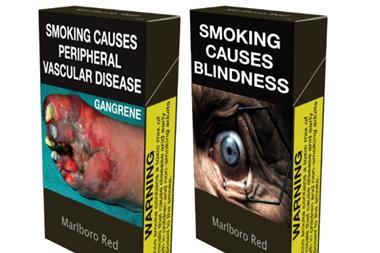The UK’s major tobacco manufacturers are arming themselves to battle plain (standardised) legislation in the courts, after MPs voted in favour of implementing the measure next May.
The measure was voted in by 367 votes to 113 in the House of Commons on Wednesday afternoon.
It means the UK is the second country in Europe after Ireland and the third in the world after Australia to pass plain packaging legislation. Australia is currently defending its law in a case before the World Trade Organisation.
BAT’s head of corporate and regulatory affairs Ronald Ridderbeekx said: “We will now commence a legal challenge against the UK government on the basis that plain packaging violates a number of UK, EU and International laws and illegally takes our valuable property from us.”
Imperial Tobacco also joined the charge. Reacting to yesterday’s news Duncan Cunningham, head of UK corporate & legal affairs at Imperial Tobacco, said: “We remain clear that the introduction of plain packaging legislation would be a mistake.
“If plain packaging passes into law, we would regrettably be left with no choice but to defend our legal rights in court as we have a fundamental right to differentiate our brands from those of our competitors.”
JTI’s managing director Daniel Torras added: “This divisive legislation has been rushed through Parliament, with little regard for proper scrutiny and debate.
“This is a cut-and-paste copycat policy from Australia, where plain packaging has not worked. It’s putting politics before process, evidence and debate. We consider this legislation to be unlawful, JTI therefore expects to challenge the legislation through the legal channels available to us.”
However, speaking at a Delegated Legislation Committee meeting earlier this week, health minister Jane Ellison expressed confidence that the legislation would be defensible.
“Let me be clear that thorough consideration has been given to such concerns. As with other tobacco control legislation, the tobacco industry is likely to challenge this measure. Indeed, the industry has already threatened legal action. However, we believe that these regulations are a proportionate and justified response to a major public health challenge, and that they will be defensible in the courts,” she said.






















2 Readers' comments